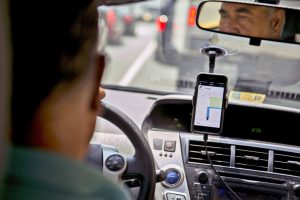By JW Law
There’s no doubt that ride share (e-hail) companies like Uber and Lyft have helped change the way we get around. Having the ability to seamlessly request a ride right at your fingertips is a game changer. The fact that it’s cheaper and convenient has afforded these Transportation Network Companies (TNC) unprecedented popularity and growth around the world in a very short time. In New Jersey alone, ride sharing companies are generating millions of trips each year.
However, this 21st Century transportation renaissance is not without controversy. As the number of people using for-hire car service increases, so do accidents. In New York City alone crashes involving for-hire vehicles have tripled over the last two years from 534 in July 2014 to 1,672 in June 2016. The higher number is perhaps attributable to the relative lack of regulation around the ride sharing companies. To cut down auto accidents and to make e-hail rides safer, New Jersey Governor Chris Christie, signed a bill regulating these companies.
The statute, known as the “Transportation Network Company Safety and Regulatory Act,” establishes statewide standards for driver eligibility, background checks, and insurance coverage.
In addition to imposing stricter background checks for prospective TNC drivers, the new law mandates ride sharing companies to carry $1.5 million of liability coverage.
The law that went into effect May 1 requires that the company or its driver or a combination of both provide insurance coverage, including at least $1.5 million in coverage for uninsured or under insured drivers. “Where there was no regulation as to how much insurance ride share vehicles were required to carry, the new law now mandates that all such vehicles, while transporting passengers or on their way to picking up a passenger, must possess enough coverage to protect those passengers, as well as the public at large.” explained attorney Jeffrey Rizika, who is chair of the Auto Committee for the New Jersey Association for Justice (NJAJ), the largest trial lawyer organization in NJ and whose practice includes automobile, truck, and bus litigation.
Although this new law does not include coverage for direct payment of a passenger’s medical bills, “if the person does not have health insurance of their own, the $1.5 million of coverage each for liability and uninsured/under-insured motorist claims more than helps to cover any outstanding medical bills incurred as a result of another’s negligence.” said Rizika.
New York recently passed a similar legislation. The New York’s bill provides for liability and under-insured motorist coverage of $1.25 million, slightly less than New Jersey’s $1.5 million of coverage, for when a passenger is being transported. However, the $1.25 million New York coverage also applies when the Uber or Lyft driver is roaming and waiting for a call from a potential passenger, while the New Jersey statute only provides $50,000/100,000 of liability coverage in this scenario.
“The New York and New Jersey bills have taken steps to protect the safety of ride share passengers and to provide them with responsible insurance coverage if they become the victim of auto negligence” said attorney Lawrence Simon, who is the co-chair of the Ride share Litigation Group of the American Association For Justice (AAJ), the country’s largest trial lawyer organization. However, there are still areas for improvement that will hopefully be addressed in future legislation. For instance, neither state requires ride share companies to perform criminal background checks on their drivers. Additionally, coverage for pedestrians, drivers and occupants of other vehicles will only be available if the ride share vehicle can be identified as a ride share vehicle. Neither state’s new laws require the posting of Uber, Lyft or other ride share provider signage on the vehicle.
Both Rizika and Simon are partners at Javerbaum Wurgaft Hicks Kahn Wikstrom & Sinins, P.C. and active members of AAJ and NJAJ, the latter of which was very active in promoting the insurance component included in the New Jersey bill.
If you are injured by a ride share vehicle or while a passenger in a ride share vehicle, please contact us as soon as possible after your accident.
[Read Related: Protect Yourself Against Hit and Run and Uninsured Drivers]